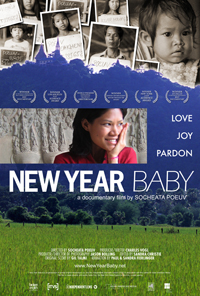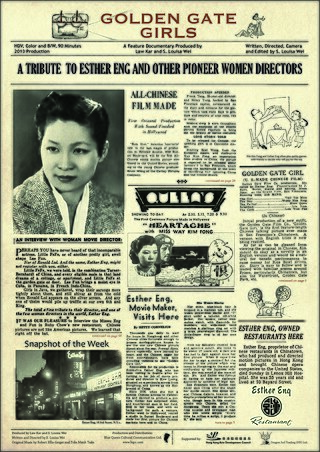
Joan Chen is a Chinese-American actress and film director. In China, she performed in the 1979 film Little Flower and came to the attention of American audiences for her performance in the 1987 film The Last Emperor. She is also known for her roles in Twin Peaks, Red Rose White Rose, Saving Face, and The Home Song Stories, and for directing the feature film Xiu Xiu: The Sent Down Girl.
Alexander Kronemer is a writer, lecturer, and documentary filmmaker whose work focuses on religious diversity, Islam, and cross-cultural understanding. He is the co-founder and executive producer of Unity Productions Foundation. Alex Kronemer is the co-founder of Unity Productions Foundation (UPF), its Executive Director, and Executive Producer for all UPF Films. He is an internationally known speaker and has published numerous articles newspapers and journals in the US and abroad, including The Washington Post, Christian Science Monitor, the Huffington Post and in syndication in international publications as widespread as the UK, Indonesia, Egypt, and Pakistan. He frequently presents at 20,000 Dialogue events, and has appeared as a CNN commentator on several occasions. Mr. Kronemer has won numerous awards for his work in promoting peace and interfaith understanding. A graduate of Harvard Divinity School, he previously served in the U.S. Department of State’s Bureau of Human Rights and was one of the founding staff members who helped establish the U.S. Institute of Peace.
Nancy Kates is an independent filmmaker based in the San Francisco Bay Area. She directed Regarding Susan Sontag, a feature documentary about the late essayist, novelist, director and activist. Through archival footage, interviews, still photographs and images from popular culture, the film reflects the boldness of Sontag’s work and the cultural importance of her thought, and received funding from the National Endowment for the Humanities, the National Endowment for the Arts, the Foundation for Jewish Culture and the Sundance Documentary Film Program.
Monkey Dance is a 2004 documentary film by Julie Mallozzi, a filmmaker based in Boston. The film follows three Cambodian-American teens growing up in Lowell, Massachusetts as they face the challenges of urban America, learn from traditional culture and dance, and reflect on the sacrifices of their parents, survivors of the Khmer Rouge.
Joyce Chopra is an American director.

Carma Hinton is a documentary filmmaker and Clarence J. Robinson Professor of Visual Culture and Chinese Studies at George Mason University. She worked with Richard Gordon in directing thirteen documentary films about China, including Morning Sun and The Gate of Heavenly Peace. She has also taught at Swarthmore College, Wellesley College, MIT, and Northeastern University and has lectured on Chinese culture, history, and film around the world.
Arthur Dong is an American filmmaker and author whose work centers on Asia America and anti-gay prejudice. He was raised in San Francisco, California, graduating from Galileo High School in June 1971. He received his BA in film from San Francisco State University and also holds a Directing Fellow Certificate from the American Film Institute Center for Advanced Film Studies. In 2007, SFSU named Dong its Alumnus of the year “for his continued success in the challenging arena of independent documentary filmmaking and his longstanding commitment to social justice."

Steven Thomas Fischer is an American film director, producer, and cartoonist. His work has been honored by the Directors Guild of America, The New York Festivals, the CINE Golden Eagle Awards, and Marquis Who's Who in Entertainment.
Nanette Burstein is an American film and television director. Burstein has produced, directed, and co-directed several documentaries including the Academy Award nominated and Sundance Special Jury Prize winning film On the Ropes.

Renee Tajima-Peña is an American filmmaker whose work focuses on immigrant communities, race, gender and social justice. Her directing and producing credits include the documentaries Who Killed Vincent Chin?, No Más Bebés, My America...or Honk if You Love Buddha, Calavera Highway, Skate Manzanar, Labor Women and the 5-part docuseries Asian Americans.
Celine Parreñas Shimizu is a filmmaker and film scholar. She is well known for her work on race, sexuality and representations. She is currently Dean of the Arts Division at the University of California at Santa Cruz.
Jeanne Jordan is an American independent director, producer and editor. She was nominated for an Academy Award and has received the Grand Jury Prize at the Sundance Film Festival among many other awards.
Steven Ascher is an American independent director, producer and writer. He was nominated for an Academy Award and has received the Grand Jury Prize at the Sundance Film Festival among many other awards. His book The Filmmaker’s Handbook is a bestselling text.

New Year Baby is a 2006 documentary film that tells the story of a family that survived the Cambodian genocide, and started a new life in the United States. The film was directed by Socheata Poeuv and produced by Charles Vogl. It won the 2007 IDFA "Movies That Matter" Award, an initiative of Amnesty International, as well as eight other international awards. It was aired on National PBS in 2008.

To Whom It May Concern: Ka Shen's Journey is a 2009 docudrama about actress Nancy Kwan. Directed and written by former Warner Bros. executive Brian Jamieson, the film depicts Kwan's meteoric rise to fame when she was selected to star in the 1960 film The World of Suzie Wong and the 1961 film Flower Drum Song. In an era when White people played the Asian roles in Hollywood, Kwan's achievement was groundbreaking. The film portrays Kwan's being cast for inconspicuous roles after her early success.
The Seattle Asian American Film Festival was founded in 1985 and has been revived over the years by different producers. The current iteration was founded in 2012 and made its debut in 2013 by co-founders Kevin Bang and Vanessa Au. It is a revival of of the previously running Northwest Asian American Film Festival, which was directed by Wes Kim from 2003 to 2007 and which had experienced a five-year hiatus. The inaugural film festival was also held at the Wing Luke Asian Museum from January 25 to 27, 2013. The festival is currently run and directed by Executive Director, Vanessa Au, and Festival Director, Victoria Ju.

Kalyanee Mam is a filmmaker whose film, A River Changes Course, which she directed and produced, has won several awards, including the Grand Jury Award for World Cinema Documentary at the 2013 Sundance Film Festival and the Golden Gate Award for Best Documentary Feature at the 2013 San Francisco International Film Festival.

The Arlington International Film Festival (AIFF) is an annual nonprofit film festival dedicated to promoting and increasing multicultural awareness and showcases world cinema and independent films in their original language with English subtitles. Independent film producers, directors and actors within the US and abroad are invited to participate in engaging panel discussions and Q&A sessions after the screenings. Each year the festival greets more than 2,000 movie aficionados and shows about fifty films from all over the world with an impressive lineup of premieres. The Arlington International Film Festival also includes a year-round events such as poster contest competitions, pre-festival screenings and art exhibitions with local artists and performances by musicians, singers and dancers.

Golden Gate Girls is a 2013 documentary film focusing on the life and works of Esther Eng (1914-1970), once honored as the first woman director of Southern China. She crossed boundaries of both gender and culture by making Cantonese language films for Chinese audiences during and after WWII. She was in fact the only woman directing feature-length films in America after Dorothy Arzner’s retirement in 1943 and before Ida Lupino began directing in 1949. After her film career, she pioneered in establishing fine dining Chinese Restaurants in New York City. She left her mark in both the Chinese and English press enabling director S. Louisa Wei to recover some of her lost stories. Clips from her two extant films, stills from her eight other motion pictures, photos from her six albums, newsreels of San Francisco as she saw them, as well as hundreds of archival images are collected to present her life and work in the most stunning visuals.
Isadora Quanehia Ding Welsh, known professionally as Loni Ding, was an documentary film maker, director, television series producer, activist, and university educator. She is known for her work exploring the experiences of Asian Americans. Notably, two of her films played a critical role in the passage of the Civil Liberties Act of 1988 which granted reparations to Japanese Americans who were incarcerated during World War II.








